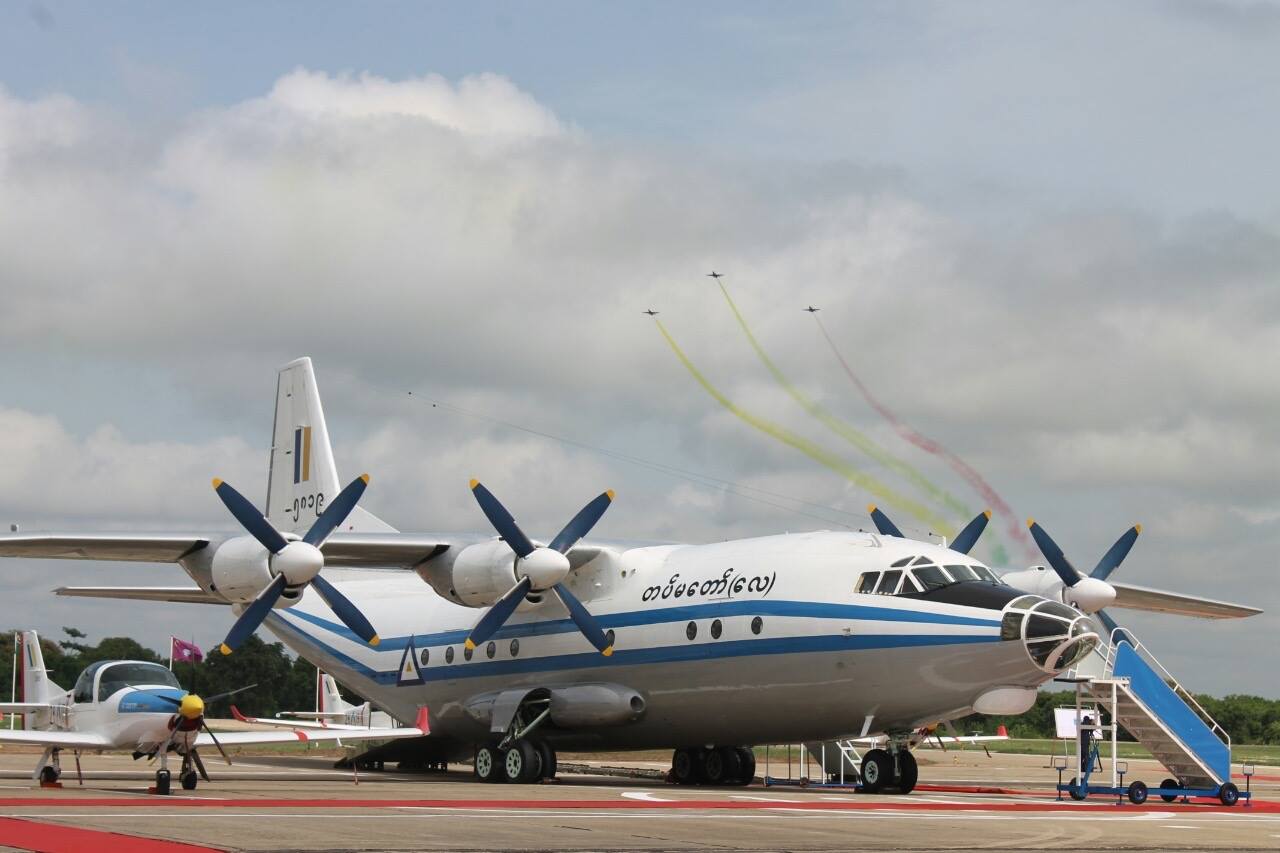YANGON—In a visit to Russia’s Irkutsk Aviation Plant Corporation on Saturday, Myanmar military chief Senior General Min Aung Hlaing personally inspected the construction of an MC-21 narrow-body airliner, checked on piloting requirements for the plane and witnessing a test flight, according to the army’s website.
The Office of the Commander-in-Chief released a brief statement accompanied by three photos showing Sen-Gen Min Aung Hlaing sitting in a cockpit next to a test pilot from the Irkutsk company. The senior general asked the pilot about flying the MC-21 as well as installation processes for the aircraft.
Last Thursday, Sen-Gen Min Aung Hlaing flew to Russia with a delegation from Myanmar ahead of the Aug. 18 closing ceremony of the International Army Games 2019 hosted by the Russian Army. He had a meeting with Russian General Sergei Kuzhugetovich Shoigu, minister of defense of the Russian Federation, but no details were released.
Irkutsk is the same company that is assembling six Sukhoi Su-30 SM multi-role advanced fighter jets for Myanmar under a contract worth about US$204 million (310.85 billion kyats) signed by the two nations last year. The market price of one of the twin-turbine engine fighter jets is around $34 million.
It remains unclear whether the military chief discussed the progress of the assembly of the fighter jets with the Russian defense minister, or discussed future arms deals. During Sen-Gen Min Aung Hlaing’s visit to the Irkutsk plant in April, he told journalists that Russa’s military hardware is “very useful” for his military in key locations in Myanmar.
The senior general’s trips to Russia always lead to speculation about possible arms deals or military-to-military ties. His personal inspection of the MC-21 at Irkutsk Aviation Plant has raised questions about whether he plans to upgrade the Myanmar Air Force’s military transportation capabilities, or if he is just seeking a VIP aircraft for top brass.

Military observer Ko Naing Swe Oo from the Thayninga Institute for Strategic Studies, a former military officer, said that as the MC-21 is the latest high-end product from Russia, the selling price is too high for Myanmar’s Air Force at the moment. He concluded that the commander-in-chief may have inspected the MC-21 for possible use by VIPs, such as top national leaders, but added that it could just be a case of the Russian Defense Ministry showing a product to its potential client, Myanmar.
Ko Naing Swe Oo explained that the Myanmar Army mostly uses Fokker 70 aircraft for VIP trips. Meanwhile, air forces in some neighboring countries including Thailand use the Airbus A-340 or Boeing 737 for VIPs.
“To possess such an airplane [the MC-21] is impossible with the current military budget. Possibly it is looking to the future of its fleet, because aircraft purchases cannot be done overnight,” said Ko Naing Swe Oo.
The selling price of the MC-21 200 is $72 million, while the MC-23 300 costs around $91 million. The MC-21 200 variant is designed for 132 to 165 passengers. Even the MC-21 200 model is twice as expensive as a multirole fighter jet.
The Myanmar military bought two Chinese-made Y8-200s for tactical military transport from China in 2016. One Y8-200F crashed into the Andaman Sea off southern Myanmar’s coast while flying from Myeik to Yangon in June 2017, killing all 122 passengers—35 military officers, 14 crew, 15 children and 58 civilians—on board.
The army recovered 92 bodies and later discovered the plane’s cockpit voice recorder and flight data recorder (or “black boxes”). The Chinese aircraft company and Myanmar military officers jointly investigated the cause of incident and found the plane went down due to unexpected weather conditions.
The Fokker series was commissioned into service alongside six new Yak-150 training jets and two ATR42-320 planes in December 2017. During 2017 military operations against Rohingya militants in northern Rakhine State, the army used Fokker planes to deploy troops to the state capital Sittwe.
The UN labeled the Myanmar military’s clearance operations—which drove more than 700,000 Rohingya into neighboring Bangladesh from northern Rakhine—as having “genocidal intent”. International rights groups called for Sen-Gen Min Aung Hlaing and other top brass to be prosecuted at the International Criminal Court to take responsibility for the operations.

















